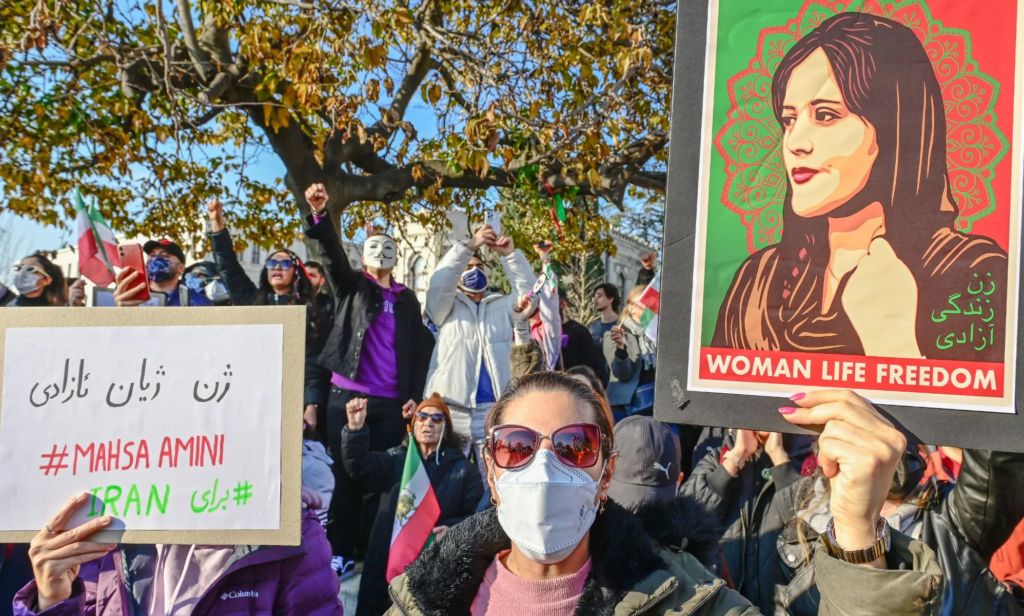In the heart of Iran’s oppressive regime, a year has passed since the tragic death of Mahsa Amini, a 22-year-old Iranian-Kurdish woman. Mahsa’s ordeal began when she was detained and beaten by the country’s “morality police” for allegedly not adhering to the strict dress code imposed on women. Her untimely death on September 16, 2022, sparked a significant wave of unrest across Iran, with LGBTQ+ voices emerging as a prominent force in the protests.
Queer Solidarity Amid Adversity
During the turmoil that followed Mahsa Amini’s death, LGBTQ+ individuals in Iran boldly embraced their identity. They fearlessly expressed their solidarity by engaging in public displays of affection, brandishing rainbow flags, and participating in demonstrations with placards proclaiming “Queer, Life, Freedom.” This uprising, marked by LGBTQ+ participation, reflects a larger narrative of marginalized groups, including women and ethnic minorities, coming together to fight for their rights and dignity in the face of an oppressive regime.
Shadi Amin: A Beacon of Hope
Shadi Amin, the executive director of the Germany-based Iranian LGBTQ+ network 6rang, exemplifies the resilience of LGBTQ+ activists in Iran. Despite growing up in a society that made her feel “sick” for being queer, Amin has dedicated herself to advocating for the LGBTQ+ community in Iran. She views the Mahsa Amini uprising as a testament to the progress made in highlighting the shared struggles of LGBTQ+ individuals, women, and marginalized groups over the past decade.

Amin asserts, “[LGBTQ+ people] are one of the most active and involved groups in these demonstrations and protests last year… We saw everywhere when there was a demonstration [there was] the rainbow flag.” Despite facing resistance from some quarters, Amin underscores the strength of the LGBTQ+ youth community in their unwavering pursuit of justice and equality.
Challenges and Progress
The path to justice has not been without challenges. Over 22,000 people were arrested, and hundreds lost their lives during the protests, including some who were executed by the state. In the face of such adversity, the flames of freedom refused to be extinguished. Public figures, political leaders, and women and girls worldwide joined the movement by cutting their hair in protest against Mahsa Amini’s tragic fate.
A report by 6Rang detailed the harrowing experiences of LGBTQ+ individuals who participated in the protests, revealing accounts of persecution, harassment, and violence based on sexual orientation and gender identity. Iran’s criminalization of same-sex sexual activity, with the possibility of the death penalty, continues to haunt LGBTQ+ people who endure violence, discrimination, social ostracization, arrest, and harassment.
Looking Ahead
Despite the hardships, Amin remains resolute in her commitment to change. She envisions a better future for young queer individuals in Iran, who should not have to endure the same struggles she faced. She emphasizes that young people in Iran, regardless of their sexuality or gender identity, are willing to risk everything for the pursuit of freedom.
The “Woman, Life, Freedom” movement, initially rooted in the Kurdish women’s freedom movement, has now become a rallying cry for LGBTQ+ individuals as well. Amin acknowledges the challenges posed by societal taboos but insists that now is the time to advocate openly for LGBTQ+ rights.
Mahsa Amini’s Impact
Mahsa Amini’s story resonated deeply because she represented the convergence of multiple marginalized identities. As Arsham Parsi, founder and executive director at the International Railroad for Queer Refugees, notes, “Mahsa Amini was kind of a slap in the face to a lot of people, and they said enough is enough.” Her Kurdish-Iranian background, her status as a woman, her youth, and her lack of religious affiliation made her relatable to many.
Continuing the Fight for Equality
While the Iranian government attempted to suppress the protests following Mahsa Amini’s death, activists stress that the struggle for the rights of women, LGBTQ+ individuals, and marginalized groups continues unabated. Silence, they argue, only conceals the inhumane actions perpetrated against those who seek justice.
Parsi, who now resides in Canada, highlights the importance of keeping the movement alive, emphasizing that ongoing awareness is crucial for the advancement of LGBTQ+ rights in Iran. He urges individuals worldwide to contribute in their own ways, whether through activism, advocacy, or simply sharing information about the situation in Iran. In a nation where being LGBTQ+ remains hidden and dangerous, global solidarity remains a beacon of hope for a more inclusive and just future.

